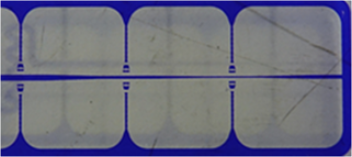
2FAST: Autonomous fluidic laboratory for the accelerated deployment of synthesis processes for materials with controlled properties
Responsible: Sophie CHARTON,
CEA MARCOULE/ISEC
Keywords: Microfluidics, solid particles, accelerated synthesis, online/in situ/real-time measurements

The implementation of chemical synthesis in continuous and miniaturized conditions (microfluidics, flow chemistry, etc.) is the key to the intensification of processes and the promise of exceptional control of operating conditions. Associated with the controlled and perfectly reproducible environments offered by miniaturized fluidic tools, research and discovery in materials chemistry can now greatly benefit from recent digital developments.
Optimization of the best synthesis route can rely on databases and online or in situ measurements, which in turn feed the databases. However, unlike the measurement of chemical composition, the methods and instruments necessary for the complete characterization of nano/micro-materials are expensive and tedious to implement, which limits them to a few research laboratories. Additionally, there is no universal path to developing a continuous chemical process. R&D is often expensive, solvents and materials are not always harmless for the environment. Agility and frugality are therefore essential.
In this project, we will fully exploit the potential offered by digitalization in so-called orchestrated microfluidic laboratories.
Thanks to the federation of major players in the field of miniaturized fluidics, who have a high degree of expertise in:
- chip design and manufacturing,
- their operation in severe conditions,
- the implementation of analytical techniques;
and thanks to recent advances in machine learning methods in materials science, we will co-develop and assemble interoperable microfluidic chips for the synthesis of materials with controlled properties. The relevance of these automated platforms will be demonstrated with the synthesis of 0D metallic materials (with rapid chemistry), 2D mineral materials (synthesized at high pressure and temperature) and ultimately hybrid materials such as MOFs, from ambient conditions to to solvo/hydrothermal conditions, with real-time control and intelligent feedback.
The project will further provide high quality data, necessary to model the properties of these materials and to provide an understanding of the role played by the chemical environment and for the search for optimal synthesis conditions.